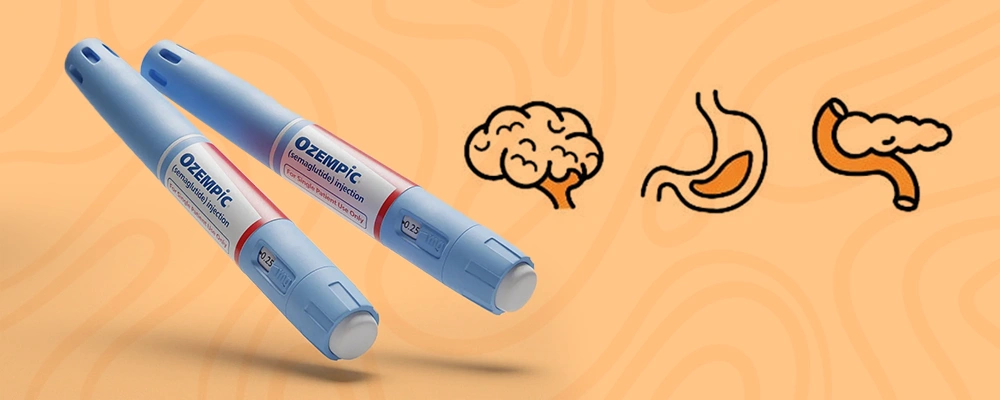Ozempic vs. Wegovy: Which Is More Effective for Weight Loss and Diabetes Management?
Both Ozempic and Wegovy are medications containing semaglutide, but their uses differ:
Ozempic is primarily for managing type 2 diabetes, helping to regulate blood sugar and reduce cardiovascular risks.
Wegovy is formulated in a higher dosage for chronic weight management, offering significant weight loss benefits.
While both share similar side effects like nausea and gastrointestinal discomfort, your choice between Ozempic vs. Wegovy depends on your specific health goals—diabetes control or weight loss. Always consult a healthcare provider for personalized advice.
The pharmaceutical industry has introduced groundbreaking medications that have significantly changed the treatment landscape for obesity and type 2 diabetes. Among these, Ozempic and Wegovy have emerged as two leading options, offering patients effective ways to manage their conditions. This article provides an in-depth Ozempic vs. Wegovy comparison, examining their effectiveness, side effects, cost, and other critical factors to help individuals make informed treatment decisions.
Understanding Obesity and Type 2 Diabetes
Before comparing Ozempic and Wegovy, it is important to understand the medical conditions they address.
Obesity
Obesity is a complex chronic disease characterized by excessive body fat accumulation, increasing the risk of serious health conditions such as type 2 diabetes, cardiovascular disease, and hypertension. Lifestyle changes, including diet and physical activity, are fundamental to weight management, but many individuals require medical intervention for significant and sustained weight loss.

Type 2 Diabetes
Type 2 diabetes is a chronic condition that affects how the body metabolizes glucose, leading to insulin resistance or insufficient insulin production. Uncontrolled diabetes can result in complications such as heart disease, kidney damage, and nerve disorders.

Ozempic: A Breakthrough in Diabetes Management
What is Ozempic?
Ozempic (semaglutide) is an FDA-approved medication primarily used for the treatment of type 2 diabetes. It belongs to a class of drugs called glucagon-like peptide-1 (GLP-1) receptor agonists, which help regulate blood sugar levels by increasing insulin secretion, decreasing glucagon production, and slowing gastric emptying. These mechanisms contribute to improved blood glucose control and potential weight loss benefits.
Effectiveness of Ozempic
Clinical studies have shown that Ozempic significantly lowers blood sugar levels and reduces A1C, making it a powerful tool in diabetes management. It has also demonstrated cardiovascular benefits by reducing the risk of major cardiovascular events, such as heart attack and stroke, in individuals with diabetes and heart disease.
Side Effects and Considerations
Common side effects of Ozempic include nausea, vomiting, diarrhea, and gastrointestinal discomfort. Some patients may also experience hypoglycemia if combined with other diabetes medications. Long-term concerns include potential links to pancreatitis and thyroid tumors, which require careful monitoring by healthcare providers. Ozempic is not recommended for individuals with a personal or family history of medullary thyroid carcinoma or multiple endocrine neoplasia syndrome type 2 (MEN 2).

Wegovy: A Game-Changer for Weight Loss
What is Wegovy?
Wegovy (semaglutide) is a higher-dose formulation of Ozempic designed specifically for weight management. It is FDA-approved for chronic weight management in adults with obesity (BMI ≥30) or overweight individuals (BMI ≥27) with weight-related medical conditions. Like Ozempic, it functions as a GLP-1 receptor agonist but is prescribed at a higher dosage to maximize weight loss benefits.
Effectiveness of Wegovy
Clinical trials have demonstrated that Wegovy leads to substantial weight loss compared to placebo and other weight management medications. Patients using Wegovy in conjunction with lifestyle modifications have experienced up to 15% weight loss over a year, improving overall health and reducing obesity-related complications. Additionally, the FDA has approved Wegovy for reducing the risk of cardiovascular events in patients with obesity and existing heart disease.
Side Effects and Considerations
Similar to Ozempic, Wegovy may cause nausea, vomiting, diarrhea, constipation, and abdominal discomfort. Some patients report changes in taste perception, while others experience gallbladder-related issues, such as gallstones. Long-term concerns include the risk of pancreatitis and potential thyroid tumors. Therefore, patients should be closely monitored by healthcare professionals to mitigate risks and adjust dosage as needed.
Due to their rising popularity, both Ozempic and Wegovy have experienced periodic supply shortages. Patients should verify availability with pharmacies and consider alternative weight management or diabetes treatment plans if necessary.

Key Differences Between Ozempic and Wegovy
| Feature | Ozempic | Wegovy |
| Primary Use | Type 2 Diabetes Management | Chronic Weight Management |
| Active Ingredient | Semaglutide | Semaglutide |
| Dosage | Lower dosage (0.5 mg, 1 mg, 2 mg per week) | Higher dosage (2.4 mg per week) |
| FDA Approval | Approved for type 2 diabetes | Approved for obesity/weight management |
| Effectiveness | Reduces blood sugar & risk of heart disease | Significant weight loss & reduced obesity-related risks |
| Side Effects | Nausea, diarrhea, hypoglycemia, GI issues | Nausea, vomiting, constipation, gallbladder issues
|
Ozempic vs. Wegovy: Conclusion
This Ozempic vs Wegovy comparison highlights key differences in their use, effectiveness, and safety. While Ozempic is primarily prescribed for diabetes management, Wegovy is designed for weight loss. Consulting a healthcare provider is crucial to determining the best option for individual needs. In conclusion, with a thorough Ozempic vs. Wegovy comparison, individuals can make informed treatment decisions based on their health goals.
For more clinical details, you can dive deeper into the effects of Ozempic vs. Zepbound, explore the differences between Mounjaro vs. Ozempic, and compare it with other weight loss medications like Ozempic vs. Saxenda.
Sources






